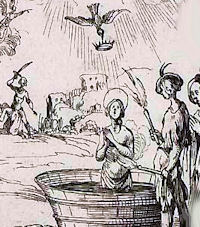Ordinary Time: September 7th
Wednesday of the Twenty-Third Week in Ordinary Time
Other Commemorations: St. Regina, Virgin & Martyr (RM); St. Cloud, Priest (RM)
» Enjoy our Liturgical Seasons series of e-books!
St. Regina (Reine) (d. 286) is commemorated today in the Roman Martyrology. She, after undergoing many cruel torments, was beheaded for the faith at Aliza, formerly a large town called Alexia, famous for the siege which Caesar laid to it, now a small village in the diocese of Autun in Burgundy. Her martyrdom happened in the persecution of Decius, in 251, or under Maximian Herecleus in 286, as different Martyrologies disagree. She is honored in many ancient Martyrologies. Her relics are kept with great devotion in the neighboring abbey of Flavigni, a league distant, whither they were translated in 864, and where they have been rendered famous by miracles and pilgrimages, of which a history is published by two monks of that abbey. —Butler's Lives of the Saints
St. Cloud (Clodoald) (522-560) is also commemorated today. He was a grandson of King Clovis of the Franks and the youngest son of King Clodomir of Orleans. He and his brothers were raised by their grandmother St. Clotilda, Queen of the Franks. Two of his brothers, Theodoald and Gunther, were slain at the ages of ten and nine by their uncle Clotaire, king of the Franks from 558-561. Clodoald survived by being sent to Provence, France. There he became a hermit and a disciple of St. Severinus. He remained at Nogent, near Paris, which became known as Saint-Cloud.
Meditation for the Month of September: Our Lady of Sorrows
God's fundamental and original intention with regard to man, whom he created in his image and after his likeness, was not withdrawn or canceled out even when man, having broken the original covenant with God, heard the words: "In the sweat of your face you shall eat bread." These words refer to the sometimes heavy toil that from then onward has accompanied human work; but they do not alter the fact that work is the means whereby man achieves that "dominion" which is proper to him over the visible world, by "subjecting" the earth. Toil is something that is universally known, for it is universally experienced. It is familiar to those doing physical work under sometimes exceptionally laborious conditions. It is familiar not only to agricultural workers, who spend long days working the land, which sometimes "bears thorns and thistles," but also to those who work in mines and quarries, to steelworkers at their blast furnaces, to those who work in builders' yards and in construction work, often in danger of injury or death. It is also familiar to those at an intellectual workbench; to scientists; to those who bear the burden of grave responsibility for decisions that will have a vast impact on society. It is familiar to doctors and nurses, who spend days and nights at their patients' bedside. It is familiar to women, who sometimes without proper recognition on the part of society and even of their own families bear the daily burden and responsibility for their homes and the upbringing of their children. It is familiar to all workers and, since work is a universal calling, it is familiar to everyone.
And yet in spite of all this toil—perhaps, in a sense, because of it—work is a good thing for man. Even though it bears the mark of a "bonum arduum," in the terminology of St. Thomas, this does not take away the fact that, as such, it is a good thing for man. It is not only good in the sense that it is useful or something to enjoy it is also good as being something worthy, that is to say, something that corresponds to man's dignity, that expresses this dignity and increases it. If one wishes to define more clearly the ethical meaning of work, it is this truth that one must particularly keep in mind. Work is a good thing for man—a good thing for his humanity—because through work man not only transforms nature, adapting it to his own needs, but he also achieves fulfillment as a human being and indeed in a sense becomes "more a human being."
Without this consideration it is impossible to understand the meaning of the virtue of industriousness, and more particularly it is impossible to understand why industriousness should be a virtue: For virtue, as a moral habit, is something whereby man becomes good as man. This fact in no way alters our justifiable anxiety that in work, whereby matter gains in nobility, man himself should not experience a lowering of his own dignity. Again, it is well known that it is possible to use work in various ways against man, that it is possible to punish man with the system of forced labor in concentration camps, that work can be made into a means for oppressing man, and that in various ways it is possible to exploit human labor, that is to say, the worker. All this pleads in favor of the moral obligation to link industriousness as a virtue with the social order of work, which will enable man to become in work "more a human being" and not be degraded by it not only because of the wearing out of his physical strength (which, at least up to a certain point, is inevitable), but especially through damage to the dignity and subjectivity that are proper to him.
—Excerpted from Laborem Exercens
St. Regina
 The life of this saint is shrouded in obscurity; all that we know about her is found in the acts of her martyrdom which are considered rather unreliable in their details. She was born in the 3rd century in Alise, the ancient Alesia where two hundred years earlier Vercingetorix had fought so valiantly against Caesar. Her mother died at her birth, and her father, a prominent pagan citizen, entrusted the child to a Christian nurse who baptized her.
The life of this saint is shrouded in obscurity; all that we know about her is found in the acts of her martyrdom which are considered rather unreliable in their details. She was born in the 3rd century in Alise, the ancient Alesia where two hundred years earlier Vercingetorix had fought so valiantly against Caesar. Her mother died at her birth, and her father, a prominent pagan citizen, entrusted the child to a Christian nurse who baptized her.
When he learned of this fact, the father flew into a rage and repudiated his own daughter. Regina then went to live with her nurse who possessed little means. The girl helped out by tending sheep, where she communed with God in prayer and meditated on the lives of the saints.
In 251, at the age of fifteen, she attracted the eye of a man called Olybrius, the prefect of Gaul, who determined to have her as his wife. He sent for the girl and discovered that she was of noble race and of the Christian Faith. Chagrined, he attempted to have her deny her faith, but the saintly maiden resolutely refused and also spurned his proposal of marriage. Thereupon, Olybrius had her thrown into prison.
Regina remained incarcerated, chained to the wall, while Olybrius went to ward off the incursions of the barbarians. On his return, he found the saint even more determined to preserve her vow of virginity and to refuse to sacrifice to idols. In a rage, he had recourse to whippings, scorchings, burning pincers, and iron combs - all to no avail as the grace of God sustained the saint. All the while, she continued to praise God and defy Olybrius. In the end, her throat was severed and she went forth to meet her heavenly Bridegroom.
—Excerpted from the Lives of the Saints by Rev. Thomas J. Donaghy
Patronage: Depicted as experiencing the torments of martyrdom; or as receiving spiritual consolation in prison by a vision of a dove on a luminous cross.
Symbols and Representation: Against poverty, impoverishment, shepherdesses, torture victims.
Highlights and Things to Do:
- Read more about St. Regina at:
St. Cloud (St. Clodoald)
 St. Cloud is the first and most illustrious Saint among the princes of the royal family of the first race in France. He was son of Chlodomir, King of Orleans, the eldest son of St. Clotilda, and was born in 522. He was scarce three years old when his father was killed in Burgundy; but his grandmother Clotilda brought up him and his two brothers at Paris, and loved them extremely.
St. Cloud is the first and most illustrious Saint among the princes of the royal family of the first race in France. He was son of Chlodomir, King of Orleans, the eldest son of St. Clotilda, and was born in 522. He was scarce three years old when his father was killed in Burgundy; but his grandmother Clotilda brought up him and his two brothers at Paris, and loved them extremely.
Their ambitious uncles divided the kingdom of Orleans between them, and stabbed with their own hands two of their nephews. Cloud, by a special providence, was saved from the massacre, and, renouncing the world, devoted himself to the service of God in a monastic state. After a time he put himself under the discipline of St. Severinus, a holy recluse who lived near Paris, from whose hands he received the monastic habit.
Wishing to live unknown to the world, he withdrew secretly into Provence, but his hermitage being made public, he returned to Paris, and was received with the greatest joy imaginable. At the earnest request of the people, he was ordained priest by Eusebius, Bishop of Paris, in 551, and served that Church some time in the functions of the sacred ministry.
He afterward retired to St. Cloud, two leagues below Paris, where he built a monastery. Here he assembled many pious men, who fled out of the world for fear of losing their souls in it. St. Cloud was regarded by them as their superior, and he animated them to all virtue both by word and example. He was indefatigable in instructing and exhorting the people of the neighboring country, and piously ended his days about the year 560.
—Excerpted from Lives of the Saints, by Alban Butler, Benziger Bros. ed. [1894]
Patronage: against carbuncles; nail makers; Diocese of Saint Cloud, Minnesota
Highlights and Things to Do:
- Visit this French site to read more about St. Cloud's life and the History of Saint Clodoald Church where his relics are buried, there is a nice YouTube video of the beautiful Saint Clodoald Church. 2022 celebrated 1500 year anniversary of the birth of Saint Cloud (Clodaold) - 522-2022.
- Read more about St. Cloud:
- Find out more about St. Cloud from the diocese in Minnesota named after this saint.
- Read Saint Clodoald: A Light for a World Trapped in Darkness.
- See some recipe ideas from Catholic Cuisine.






